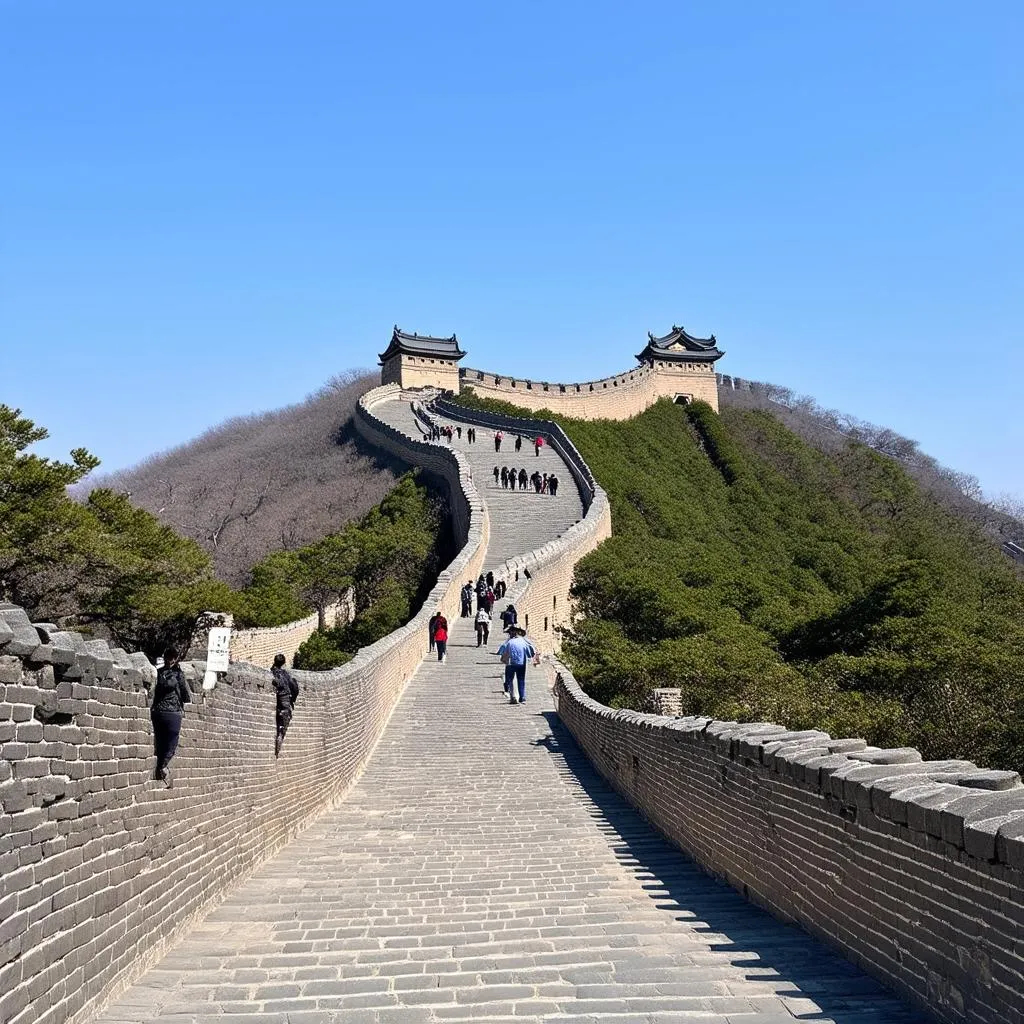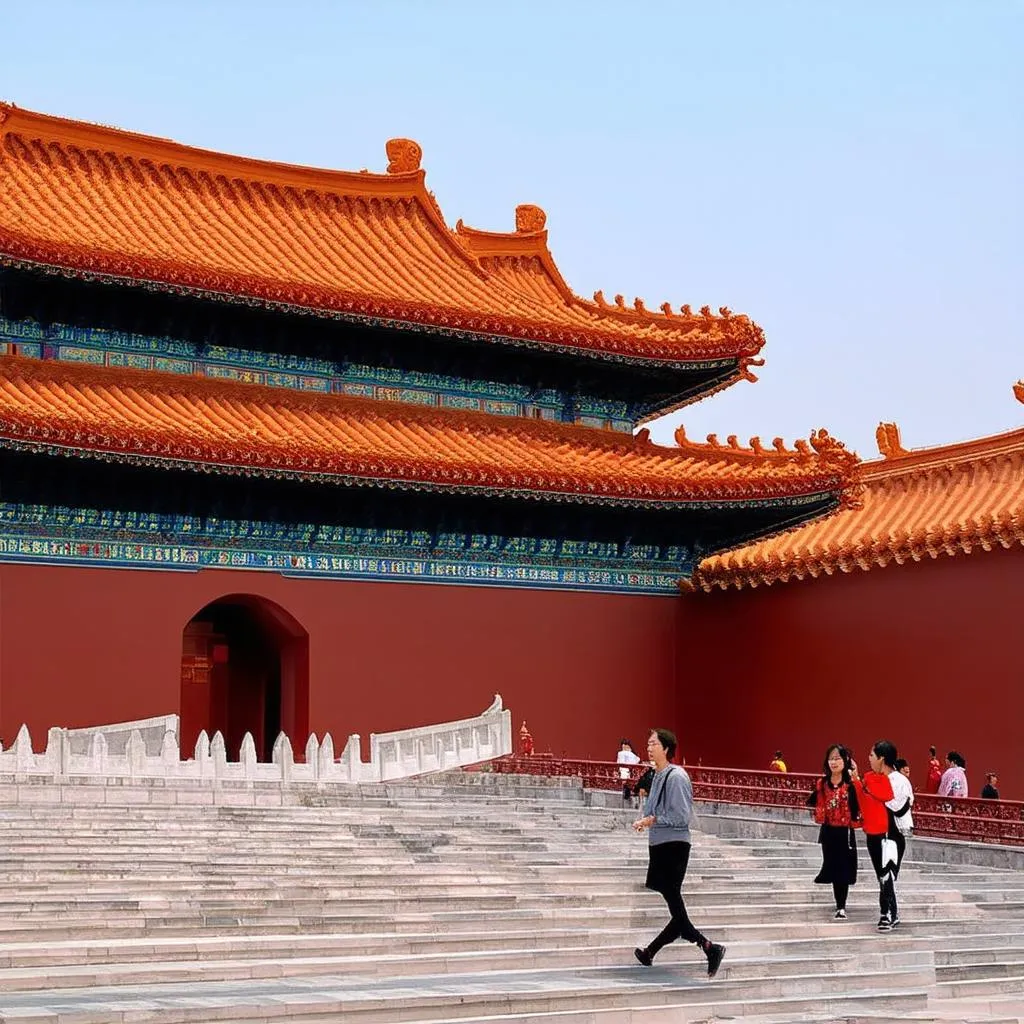Have you ever dreamt of exploring the Great Wall of China, marveling at the Terracotta Army, or immersing yourself in the bustling streets of Shanghai? Obtaining a China tourist visa is the first step towards fulfilling your travel aspirations. This comprehensive guide will equip you with all the necessary information to navigate the visa application process smoothly.
Understanding the Basics
What is a China Tourist Visa?
A China tourist visa, formally known as a L Visa, grants foreign nationals the permission to enter China for tourism purposes. It allows you to explore the country’s breathtaking landscapes, experience its vibrant culture, and indulge in its delicious cuisine.
Types of China Tourist Visas:
There are two main types of tourist visas:
- L Visa: This is the most common type of tourist visa for short-term visits, typically lasting 30 days or less.
- L Visa (Group): This visa is specifically for groups of tourists traveling together, and the duration can vary depending on the itinerary.
Who Needs a China Tourist Visa?
Citizens of most countries, including the United States, Canada, and Australia, require a visa to enter China. However, there are a few exceptions, so it’s always best to check with the Chinese embassy or consulate in your country for the most up-to-date information.
Essential Documents for Your Application
To apply for a China tourist visa, you will need the following documents:
- A valid passport: Your passport must be valid for at least six months beyond your intended date of departure from China.
- Visa application form: Complete the application form accurately and truthfully. You can download the form from the official website of the Chinese embassy or consulate.
- Recent passport-sized photographs: Two recent passport-sized photographs with a white background are required.
- Proof of financial means: Provide evidence that you can financially support yourself during your stay in China. This could include bank statements, credit card statements, or a letter of financial support from a sponsor.
- Itinerary: Submit a detailed itinerary that outlines your planned travel route, accommodation arrangements, and activities.
- Invitation letter (if applicable): If you’re invited to China by a Chinese citizen, you will need to provide a letter of invitation from your host.
- Flight confirmation: Provide confirmation of your round-trip flights to and from China.
- Travel insurance: It’s recommended to have travel insurance that covers medical expenses and other emergencies during your trip.
- Previous visas (if applicable): Submit copies of any previous visas you may have received from China.
Note: The specific requirements for visa applications can vary depending on your nationality and the country you’re applying from. Always check with the Chinese embassy or consulate in your country for the most up-to-date guidelines.
Understanding the Visa Application Process
Where to Apply:
You can apply for a China tourist visa at the Chinese embassy or consulate in your country of residence.
Processing Time:
The processing time for a China tourist visa can vary depending on your nationality and the embassy or consulate where you’re applying. It typically takes about 5 to 10 working days. However, it’s advisable to apply at least two weeks before your planned departure date to avoid any delays.
Visa Fee:
There is a visa fee associated with the application. The fee amount varies depending on your nationality and the processing time.
Navigating the Application Process: A Step-by-Step Guide
Here’s a step-by-step guide to help you through the China tourist visa application process:
- Gather all the required documents. Ensure that all your documents are complete and accurate before submitting your application.
- Complete the visa application form. Pay close attention to the details and provide accurate information.
- Schedule an appointment at the embassy or consulate. You can typically schedule an appointment online or by phone.
- Attend your appointment. Bring all your required documents and photographs. You will be interviewed by a visa officer and may be asked additional questions.
- Pay the visa fee. You can pay the visa fee in cash or by credit card.
- Receive your visa. You will typically receive your visa within 5 to 10 working days.
- Check your visa details. Make sure the information on your visa is correct, including your name, passport number, visa type, and expiry date.
Tips for a Successful Visa Application
Here are some tips to maximize your chances of getting your China tourist visa:
- Start early. Don’t wait until the last minute to apply for your visa. Allow ample time for processing.
- Provide accurate information. Ensure all the details you provide in your application form are correct and truthful.
- Be prepared for the interview. Practice answering common visa interview questions to ensure you can articulate your travel plans effectively.
- Be polite and respectful. During your interview, maintain a professional demeanor and treat the visa officer with courtesy.
- Maintain a clean and organized application. Submit a well-organized application package to make a good impression on the visa officer.
Common Questions About the China Tourist Visa
Q: Can I extend my tourist visa in China?
A: Yes, you can apply for a visa extension if you need to stay in China longer than your initial visa allows. You will need to submit a visa extension application form and provide evidence of the reasons for your extended stay.
Q: What is the best time of year to visit China?
A: The best time to visit China depends on your preferred weather conditions and interests. Spring (March-May) and Autumn (September-November) are generally considered the most pleasant times to visit. Spring offers mild temperatures and blooming flowers, while autumn boasts clear skies and vibrant foliage. However, summer (June-August) can be hot and humid, especially in the south. Winter (December-February) is generally cold, especially in the north.
Q: What are some must-see destinations in China?
A: China offers a diverse range of attractions that cater to every traveler’s taste. Some of the most popular destinations include:
- The Great Wall of China: This iconic landmark is a must-see for any visitor to China. It stretches for thousands of miles across the country, offering breathtaking views and a glimpse into China’s rich history.
 great_wall
great_wall - The Forbidden City: Located in Beijing, the Forbidden City was the imperial palace of China for centuries. It is now a UNESCO World Heritage Site and offers a glimpse into the grandeur of China’s imperial past.
 forbidden_city
forbidden_city - The Terracotta Army: Located near Xi’an, the Terracotta Army is an astounding collection of life-sized terracotta sculptures of warriors and horses. It is a testament to the artistic skills and military might of ancient China.
- Shanghai: This bustling metropolis is a vibrant mix of modern skyscrapers and traditional neighborhoods. Explore its iconic landmarks, indulge in its culinary delights, and experience its vibrant nightlife.
Q: Are there any special considerations for traveling to China during the COVID-19 pandemic?
A: Due to the ongoing COVID-19 pandemic, there may be travel restrictions and quarantine requirements in place for visitors to China. It is essential to check the latest travel advisories and guidelines issued by the Chinese government and your local authorities before planning your trip.
Q: What is the best way to get around China?
A: China has a comprehensive transportation system. You can choose from a variety of options, including:
- High-speed trains: These are a convenient and affordable way to travel between major cities in China.
- Domestic flights: For longer distances, domestic flights are a fast and efficient option.
- Bus: Buses are a more economical option for traveling between smaller cities and towns.
Q: What are some cultural tips for traveling to China?
A: China has a rich culture and etiquette. Here are some cultural tips to keep in mind when traveling to China:
- Respect elders. Show respect to elders by addressing them politely and offering them assistance.
- Avoid loud conversations in public. Public displays of affection are generally frowned upon.
- Be mindful of your table manners. Use chopsticks correctly and avoid sticking them upright in your rice bowl.
- Practice humility. Avoid boasting or showing off.
- Learn a few basic Mandarin phrases. Even a simple greeting can go a long way in showing respect and fostering communication.
Q: What are the safety considerations for travelers in China?
A: China is generally a safe country for travelers. However, it’s always important to take basic precautions:
- Be aware of your surroundings. Keep an eye on your belongings and avoid walking alone at night in unfamiliar areas.
- Be cautious about scams. Don’t be tricked by people offering you fake souvenirs or asking for money.
- Learn a few basic safety phrases in Mandarin. This can be helpful if you encounter any problems.
- Follow local laws and customs. Respect the local laws and customs to avoid any potential trouble.
Q: What are some popular Chinese dishes to try?
A: Chinese cuisine is renowned for its diverse flavors and culinary traditions. Here are some must-try dishes:
- Peking Duck: This iconic dish is a must-try for any visitor to Beijing. It features crispy duck skin and tender meat.
- Xiao Long Bao (soup dumplings): These delicate dumplings are filled with savory broth and meat.
- Mapo Tofu: This Sichuan dish is known for its spicy and flavorful tofu.
- Kung Pao Chicken: This stir-fried chicken dish is popular for its savory and spicy flavors.
Q: What are some unique cultural experiences to have in China?
A: Beyond its iconic landmarks, China offers a wealth of cultural experiences:
- Attend a traditional Chinese opera performance: Experience the rich history and artistry of Chinese opera.
- Visit a Chinese temple: Learn about the spiritual traditions of Chinese culture.
- Take a calligraphy lesson: Explore the art of Chinese calligraphy.
- Visit a traditional Chinese medicine clinic: Discover the fascinating world of traditional Chinese medicine.
Q: What is the best way to learn about the history of China?
A: China has a rich and fascinating history. Here are some ways to learn more about its past:
- Visit historical sites: Explore ancient ruins, temples, and palaces to gain insight into China’s past.
- Read books and articles: Consult historical texts and scholarly works to delve deeper into China’s history.
- Attend museum exhibitions: Visit museums dedicated to Chinese history and culture.
- Learn about Chinese dynasties: Explore the different dynasties that ruled China and their contributions to history and culture.
Q: What are some recommendations for booking travel and accommodation in China?
A: China offers a wide range of travel and accommodation options. Here are some recommendations:
- Book flights and accommodation in advance: This is especially important during peak tourist season.
- Consider using online travel booking platforms: These platforms can help you find the best deals on flights, hotels, and other travel arrangements.
- Explore local travel agencies: If you’re interested in a more personalized itinerary, consider working with a local travel agency.
- Use a travel guide or app: These resources can provide information on attractions, restaurants, transportation, and other useful information.
Q: What is the best way to communicate in China?
A: While English is spoken in some tourist areas, Mandarin is the official language of China. It’s helpful to learn a few basic Mandarin phrases to facilitate communication. You can also use a translation app or hire a local guide.
Q: What is the best way to stay safe while traveling in China?
A: China is generally a safe country to travel in. However, it’s important to be aware of your surroundings and take common-sense precautions:
- Be aware of your surroundings. Keep an eye on your belongings and avoid walking alone at night in unfamiliar areas.
- Be cautious about scams. Don’t be tricked by people offering you fake souvenirs or asking for money.
- Learn a few basic safety phrases in Mandarin. This can be helpful if you encounter any problems.
- Follow local laws and customs. Respect the local laws and customs to avoid any potential trouble.
Travelcar.edu.vn: Your Ultimate Travel Partner
Looking for more information about traveling to China or other destinations around the world? Visit TRAVELCAR.edu.vn, your one-stop shop for all things travel! Our website provides comprehensive travel guides, helpful tips, and inspiring travel stories to help you plan your next adventure.
Have any other questions about obtaining a China tourist visa or traveling to China? Leave a comment below, and we’ll be happy to assist you!
Remember, travel is a journey of discovery, and with the right planning and preparation, your China adventure awaits.

 forbidden_city
forbidden_city
